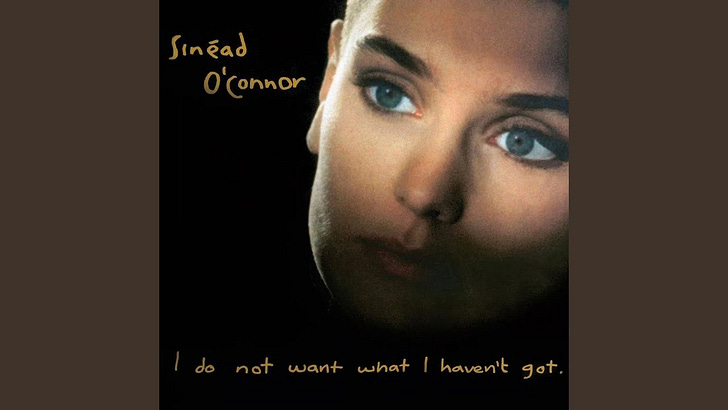Sinead's "The Last Day of Our Acquaintance": A Kiss-Off Into the Air
Sinead’s speaker in “The Last Day of Our Acquaintance” wears her heart on her sleeve—divulging the entire history of a relationship in four and a half minutes. To what extent this song is confessional I cannot speculate, however, no matter–it is one of the great kiss-off songs of all time. As O’Connor breathes, the relationship has eroded over the past two years. “You used to hold my hand when the plane took off,” she states matter-of-factly. That emotional closeness has dissipated. What exactly happened to that love? Fickle emotions once again. “I will meet you later in somebody’s office.” This is a divorce song–an end of the road for this particular couple.
Appearing as the penultimate song on Sinead’s I Do Not Want What I Haven’t Got, “The Last Day of Our Acquaintance” is, to my mind, perhaps the album’s fulcrum. Like many of the other songs on the great 1990 album, “Acquaintance” is delivered in full address of the listener–a sonic dramatic monologue. Not only is Sinead brutally honest, as always, but she sings to “you”—we can imagine being the object of her disappointment and bubbling fury. Bye-bye-bye.
In processing some of the subtle aspects of this song, I would point out the formal diction of the lyrics. “Acquaintance” is a biting word—undercutting the intimacy of the relationship. We used to be lovers. Now we are simply acquaintances (and not even friends)–pretty soon, not even that. The song indicates a lack of attention to listening, understanding, empathy–all of which must be some of the most common reasons for divorce. The song is universal in its exploration of a chronic failure to communicate. Sinead’s lyrics build to a full bodied conclusion, culminating in what almost sounds like an ancient Celtic wail. Oh-oh-oh!
Nirvana’s Nevermind appeared in September of 1991; I Do Not Want What I Haven’t Got in March of 1990. It is worth mentioning that Sinead’s soft to loud approach, often mentioned as a Nirvana staple, appeared sixteen months earlier. And Sinead truly went soft–some songs are so muted, at least in the opening minutes, the listener may wonder for a few seconds if the album is still playing (the fact that I discovered this album on cassette tape only exacerbated the softness). “Acquaintance” is such a song–the first half is an acoustic guitar, barely strummed, and Sinead’s absolutely pristine voice, perfectly recorded. Other tracks are a cappella or nearly so. Sinead’s minimalistic tendencies bring out the best in her voice and underscore the elemental aspects of her songs—they are universal messages in a bottle. It must be noted that not everyone cared for Sinead O’Connor, for one reason or another—but listen to the song itself. One would have to have a heart of granite to remain unaffected.
When a musician passes, much is made of their life and persona—we cannot escape Sinead’s cult of personality created by MTV and the media. It is in our face–at times to the detriment of the actual songs she created. Like so many other celebrities Sinead viewed this as an imposition–and it was; her fame almost transcended her music and still does. Look at how many musicians over the years have been ground into pulp by the hype machine. However, the careful listener will notice a precision and discipline in her lyrics and performances that will never die. There is a reason I Do Not Want What I Haven’t Got is considered a masterpiece–every song on the album presents an honest assessment. No spin, no B.S. Just one woman and her fingerprint on the world.


